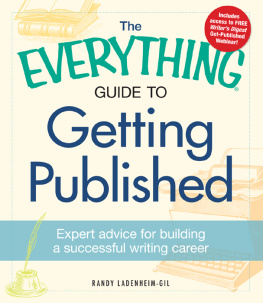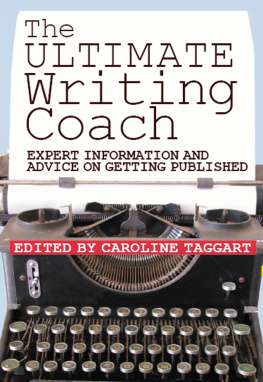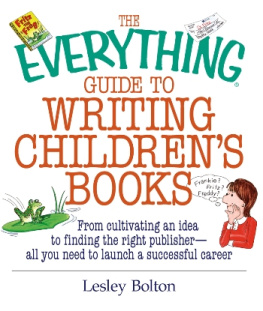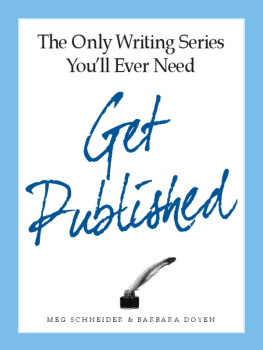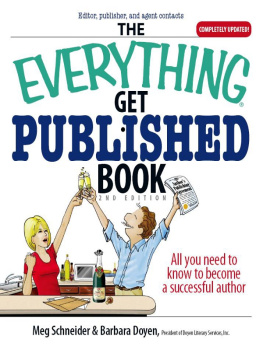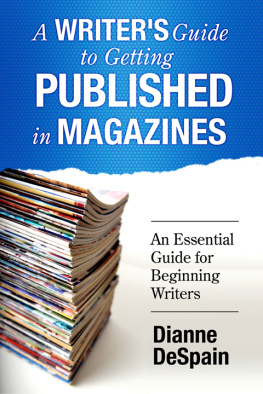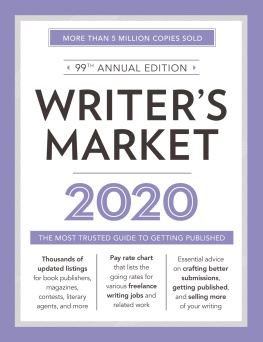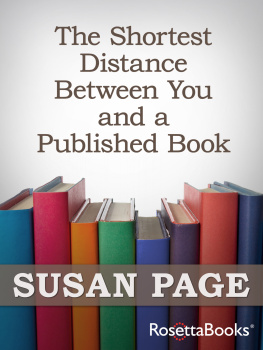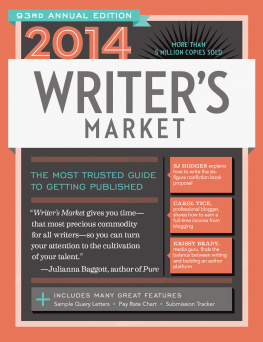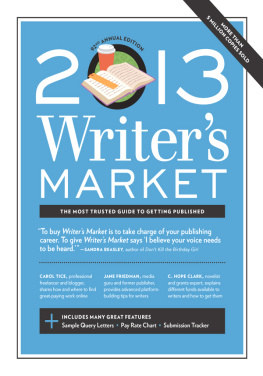THE

GUIDE TO
GETTING PUBLISHED
Broadly speaking, there are two kinds of writersthose who want to write, and those who want to have written. The first group consists of people who would like to be published someday, but, even if that never happens, theyll continue to write because writing is as much a part of their lives as breathing. The second group tends to be more businesslike, wanting at least recognition and perhaps the fame and fortune that comes along with being a bestselling author.
Theres nothing wrong with either approach. Writing can be a reward in itself, but there are few thrills that compare with seeing your name in printassociated with the words that you wrotewhether its in your local newspaper, a national magazine, a popular blog, or on the cover of a book. And when someone actually pays you for what youve written, well, thats like having an extra scoop of ice cream on your cone.
My goal in this book is to expand your knowledge of publishing in general and to introduce you to the myriad opportunities to see your words in print. As a writer myself, I treasure every tiny thrill of success in my quest for publication, and I hope you will find and savor the same pleasures on your journey.
May you find success!

Welcome to the

Series!
These handy, accessible books give you all you need to tackle a difficult project, gain a new hobby, comprehend a fascinating topic, prepare for an exam, or even brush up on something you learned back in school but have since forgotten.
You can choose to read an Everything book from cover to cover or just pick out the information you want from our four useful boxes: e-questions, e-facts, e-alerts, and e-ssentials. We give you everything you need to know on the subject, but throw in a lot of fun stuff along the way, too.
We now have more than 400 Everything books in print, spanning such wide-ranging categories as weddings, pregnancy, cooking, music instruction, foreign language, crafts, pets, New Age, and so much more. When youre done reading them all, you can finally say you know Everything!

PUBLISHER Karen Cooper
DIRECTOR OF ACQUISITIONS AND INNOVATION Paula Munier
MANAGING EDITOR, EVERYTHING SERIES Lisa Laing
COPY CHIEF Casey Ebert
ASSISTANT PRODUCTION EDITOR Melanie Cordova
ACQUISITIONS EDITOR Lisa Laing
DEVELOPMENT EDITOR Laura M. Daly
EDITORIAL ASSISTANT Ross Weisman
EVERYTHING SERIES COVER DESIGNER Erin Alexander
LAYOUT DESIGNERS Erin Dawson, Michelle Roy Kelly, Elisabeth Lariviere, Denise Wallace
Visit the entire Everything Series at www.everything.com
THE

GUIDE TO
GETTING
PUBLISHED
Expert advice for
building a successful writing career
Randy Ladenheim-Gil

To Eunice Riedel, who didnt live long
enough to see how much she had taught me
simply by her example.
The Top Ten Things You Should Know about Getting Published
- Writers today have more opportunities than ever before to get published in traditional and virtual media, and more opportunity means more demand for good writers.
- The difference between a rejection and a contract often lies in the quality of your market research, not necessarily in the quality of your writing.
- The maxims Think like an editor and Write to the market are code for putting the reader first.
- The fierce competition in publishing is really an opportunity to learn and motivation to improve.
- Submission guidelines are your friends; your work stands the best chance of getting noticed when you follow them.
- Constructive criticism should be cherished. It can make you a more effective writer and increase your chances of getting published.
- In traditional book publishing, look for a good agent before you try to approach editors on your own.
- Building solid, respectful working relationships with editors will help your career more than writing the perfect query will.
- A healthy skepticism is your best protection against scams and the unscrupulous.
- Getting published is the gravy. The real joy is in the writing, and no one can ever deny you that.
Introduction
There always has been a peculiar romance about writers and writing. The process itself is mysterious, even sometimes to those who do it for a hobby or for a living; it has been compared to giving birth, and it has been described as a form of madness. Most writers dont like to delve too deeply into the mystery of writing. They fear that the magic will evaporate and leave only the wispy, dreamlike memory of the excitement they feel when the perfect combination of words bubbles up from their inner wells. Madness it may be, and laborious, and inexplicable. It doesnt matter. Its what we do.
But thats only part of the romance. The true seduction of writing is the idea that somebody, somewhere, someday will read what we write and be touched, informed, and entertained by it. And, when that happens, we achieve a sort of demigod status, even if only for a fleeting moment. That is the glory of getting published; not just the first time, but every time.
How to get published also is a major mystery for many writers. Countless aspiring authors of every genre find themselves flummoxed and befuddled by a steady stream of standard rejection letters and wonder if there is some dark conspiracy at work to keep their words out of the reading publics hands. Its easy to believe in such a theory when you dont know the inner workings of magazine and book publishers. For ninety-nine out of 100 hopeful writers, the unpalatable truth is that mere talent and great ideas are not enough to pierce the natural and strong sales resistance in todays publishing market. You need a platform to stand on, a track record to prove your ability, and a thorough familiarity with the needs and wants of your readers and the editors who select content for them. There is precious little romance about the publishing business, and writers who want to build a career for themselves doing what they love to do must learn to balance the sentimental glamour of the process with the more prosaic realities of the industry.
Thats the bad news. The good news is that there are more opportunities for new writers to break into the business than ever before. Depending on where your interests and talents lie, you might pursue landing bylined feature assignments from national consumer magazines or having your short stories or poems published in small but high-quality literary magazines. You might write exclusively for the innumerable e-zines available on the web. You might contribute to newsletters for hobbyists, or financial analysts, or chiefs of police. Or you might write press releases and copy for a corporations quarterly or annual report.

